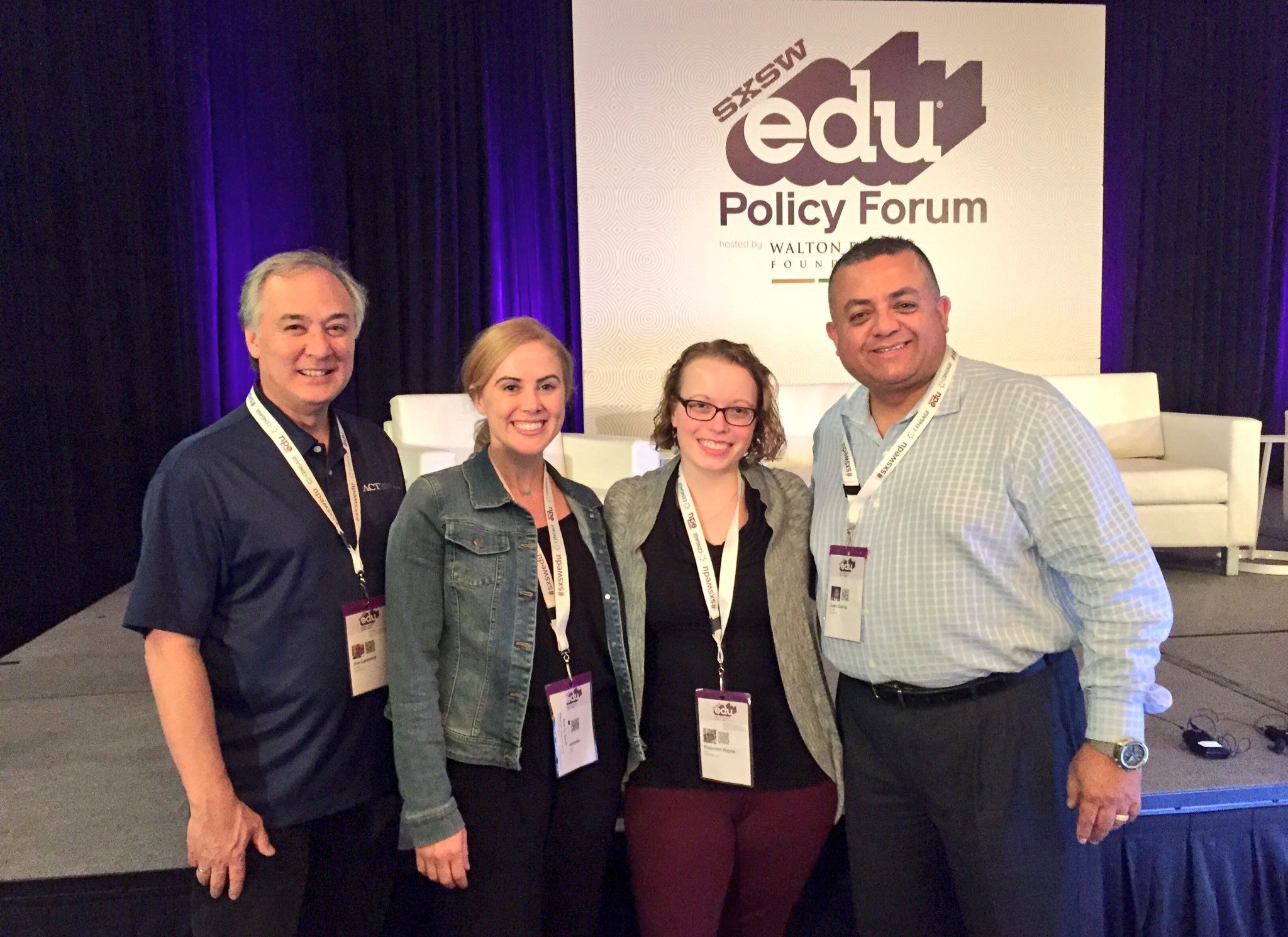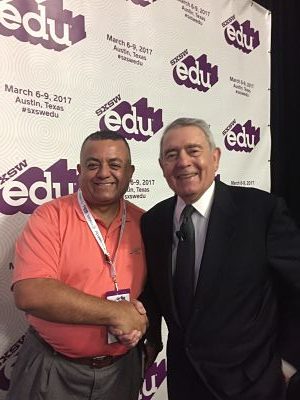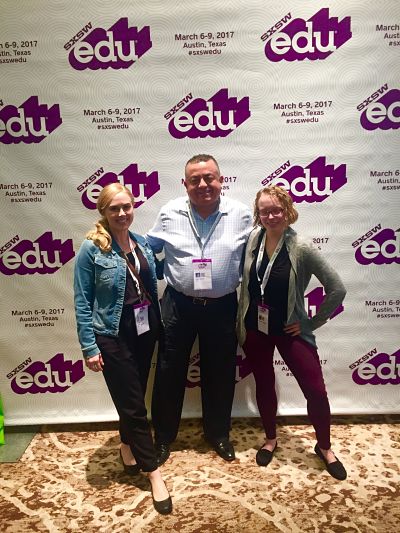
Sustainably, collaboration, community, accessibility, health, and equity in education are not words commonly discussed in conversations at SXSWedu. Unlike years past, this year’s SXSWedu programming was chockfull of discussions about inequities in education, tackling tomorrow’s problems, serving underrepresented populations, and the importance of diversity in schools. While the conference still had its share of edtech start-ups and innovative technology, there were more talks about ensuring those start-ups were not isolating populations of students with new technology. SXSWedu gave attendees opportunities to discuss important issues of equity in education, and we were thrilled to take part in these discussions.
 Creating impact was a hot topic this year at the edtech conference. The Rather Prize took center stage and set the tone for the entire conference by highlighting the importance of creating local impact in our public school systems. In its second year, the Rather Prize awards a 10k prize to the teacher, student, or administrator behind the best idea to improve Texas public schools. Lake Dallas Elementary’s Katie Landaverde was this year’s winner and will use the prize to fund her exploratory morning work-shops for elementary students led by community volunteers, teachers, and high school students. Her students will be able to explore any interest of their choice by accessing technology while simultaneously fostering community engagement. Lake Dallas Elementary has a diverse population and many students do not have access to technology. By allowing all her students’ free time to understand their interests, students are able to get back to the root of education and develop 21st century skills while creating community participation. Congrats to Lake Dallas Elementary, we look forward to seeing the impact you’ll create in the coming year for your community and Texas public schools.
Creating impact was a hot topic this year at the edtech conference. The Rather Prize took center stage and set the tone for the entire conference by highlighting the importance of creating local impact in our public school systems. In its second year, the Rather Prize awards a 10k prize to the teacher, student, or administrator behind the best idea to improve Texas public schools. Lake Dallas Elementary’s Katie Landaverde was this year’s winner and will use the prize to fund her exploratory morning work-shops for elementary students led by community volunteers, teachers, and high school students. Her students will be able to explore any interest of their choice by accessing technology while simultaneously fostering community engagement. Lake Dallas Elementary has a diverse population and many students do not have access to technology. By allowing all her students’ free time to understand their interests, students are able to get back to the root of education and develop 21st century skills while creating community participation. Congrats to Lake Dallas Elementary, we look forward to seeing the impact you’ll create in the coming year for your community and Texas public schools.
Many panels and meet-ups were teacher-focused and applauded teachers for being on the frontlines and taking up courageous conversations about race, immigration, religion, and privilege. One highlight of these discussions was a panel on “Investing in Teachers as Innovators.” Molly McMahon, Director of Teacher’s Guild, said “teachers aren’t just teachers anymore, they are technologists.” She emphasized that in our current political climate teachers are the ones leading tough dialogue across schools and inviting communities to have the same dialogue. Teachers are the ones trying new technologies and ensuring that these technologies are accessible to all students. We couldn’t agree more and salute the hard work of teachers, school counselors, and administrators who are tackling these issues and finding solutions to meet the needs of all students.
 Another highlight was Sara Goldrick-Rab’s keynote on the price of college and the real issues facing college students. Sara questions our current system and asks the audience to think about why we are not asking the real questions that are affecting student performance. Let’s ask students—how much sleep are you getting? Have you eaten lately? How many jobs are you working? Are you paying bills for your family? These are the questions, Sara says, that are vital to student success in college, and in high school for that matter. She then asked the audience if we ever had a student fall asleep in our classroom. As a former high school English teacher, I raised my hand along with many other audience members. Many of us knew where Sara was going with her question as she begin to tell a story of a girl who had fallen asleep in her classroom three times. Sara finally understood that the girl was working the graveyard shift just to afford to be in her class; many of us in the room had similar experiences. Sara cites that 24% of students are food-insecure, 16% had trouble paying rent, and an estimated 13% of community college students are homeless. Those are shocking statistics. She urged us to think about living expenses as educational expenses because more than half of college expenses are living costs. In her final words, she said “we have to do better for our most vulnerable and if we think about what we don’t know, then we can do some good.” Do not just assume students who are falling asleep in classrooms are not engaged—they might just be hungry, homeless, or working two jobs. Thank you, Sara, for shining a light on real issues students face—health, housing, and finances.
Another highlight was Sara Goldrick-Rab’s keynote on the price of college and the real issues facing college students. Sara questions our current system and asks the audience to think about why we are not asking the real questions that are affecting student performance. Let’s ask students—how much sleep are you getting? Have you eaten lately? How many jobs are you working? Are you paying bills for your family? These are the questions, Sara says, that are vital to student success in college, and in high school for that matter. She then asked the audience if we ever had a student fall asleep in our classroom. As a former high school English teacher, I raised my hand along with many other audience members. Many of us knew where Sara was going with her question as she begin to tell a story of a girl who had fallen asleep in her classroom three times. Sara finally understood that the girl was working the graveyard shift just to afford to be in her class; many of us in the room had similar experiences. Sara cites that 24% of students are food-insecure, 16% had trouble paying rent, and an estimated 13% of community college students are homeless. Those are shocking statistics. She urged us to think about living expenses as educational expenses because more than half of college expenses are living costs. In her final words, she said “we have to do better for our most vulnerable and if we think about what we don’t know, then we can do some good.” Do not just assume students who are falling asleep in classrooms are not engaged—they might just be hungry, homeless, or working two jobs. Thank you, Sara, for shining a light on real issues students face—health, housing, and finances.
SWSWedu was inspiring as the discussions ranged from youth with disabilities and what they wanted from education to ensuring diversity in schools and addressing the critical needs for students in the ELL digital space. Additionally, SXSWedu was filled with more policy makers who were putting access and equity in education at the forefront of the conversation. We were delighted to be at SXSWedu to engage in these important conversations with change makers, students, teachers, foundations, and other voices who added to a robust and spirited conference. We look forward to SXSWedu 2018 and like many of our friends and partners who attended this year’s conference; we will continue our efforts to create opportunity and access for all students.
Watch more panelist and keynote speakers from SXSWedu 2017 here.
